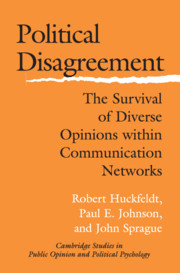Book contents
- Frontmatter
- Contents
- List of Figures
- List of Tables
- Acknowledgments
- 1 COMMUNICATION, INFLUENCE, AND THE CAPACITY OF CITIZENS TO DISAGREE
- 2 NEW INFORMATION, OLD INFORMATION, AND PERSISTENT DISAGREEMENT
- 3 DYADS, NETWORKS, AND AUTOREGRESSIVE INFLUENCE
- 4 DISAGREEMENT, HETEROGENEITY, AND THE EFFECTIVENESS OF POLITICAL COMMUNICATION
- 5 DISAGREEMENT, HETEROGENEITY, AND PERSUASION: HOW DOES DISAGREEMENT SURVIVE?
- 6 AGENT-BASED EXPLANATIONS, PATTERNS OF COMMUNICATION, AND THE INEVITABILITY OF HOMOGENEITY
- 7 AGENT-BASED EXPLANATIONS, AUTOREGRESSIVE INFLUENCE, AND THE SURVIVAL OF DISAGREEMENT
- 8 HETEROGENEOUS NETWORKS AND CITIZEN CAPACITY: DISAGREEMENT, AMBIVALENCE, AND ENGAGEMENT
- 9 SUMMARY, IMPLICATIONS, AND CONCLUSION
- APPENDIX A THE INDIANAPOLIS–ST. LOUIS STUDY
- APPENDIX B THE OPINION SIMULATION SOFTWARE
- References
- Index
4 - DISAGREEMENT, HETEROGENEITY, AND THE EFFECTIVENESS OF POLITICAL COMMUNICATION
Published online by Cambridge University Press: 03 December 2009
- Frontmatter
- Contents
- List of Figures
- List of Tables
- Acknowledgments
- 1 COMMUNICATION, INFLUENCE, AND THE CAPACITY OF CITIZENS TO DISAGREE
- 2 NEW INFORMATION, OLD INFORMATION, AND PERSISTENT DISAGREEMENT
- 3 DYADS, NETWORKS, AND AUTOREGRESSIVE INFLUENCE
- 4 DISAGREEMENT, HETEROGENEITY, AND THE EFFECTIVENESS OF POLITICAL COMMUNICATION
- 5 DISAGREEMENT, HETEROGENEITY, AND PERSUASION: HOW DOES DISAGREEMENT SURVIVE?
- 6 AGENT-BASED EXPLANATIONS, PATTERNS OF COMMUNICATION, AND THE INEVITABILITY OF HOMOGENEITY
- 7 AGENT-BASED EXPLANATIONS, AUTOREGRESSIVE INFLUENCE, AND THE SURVIVAL OF DISAGREEMENT
- 8 HETEROGENEOUS NETWORKS AND CITIZEN CAPACITY: DISAGREEMENT, AMBIVALENCE, AND ENGAGEMENT
- 9 SUMMARY, IMPLICATIONS, AND CONCLUSION
- APPENDIX A THE INDIANAPOLIS–ST. LOUIS STUDY
- APPENDIX B THE OPINION SIMULATION SOFTWARE
- References
- Index
Summary
The Columbia studies revolutionized the study of democratic politics, inspiring a view of the electorate based on interdependent citizens who reach decisions through a shared process of collective deliberation. This perspective led many to expect that citizens would be imbedded within homogeneous micro-environments of politically like-minded associates, but as we have seen, citizen communication networks demonstrate remarkably high levels of political heterogeneity. Within this context, we examine the implications of disagreement and political heterogeneity for the effectiveness of political communication and deliberation among citizens during a presidential election campaign. In order for communication to be effective, messages conveyed through social interaction must be unambiguous, and the person receiving the communication must readily, confidently, and accurately perceive the intent of the sender. Hence, we address a number of factors that might influence communication effectiveness among individual citizens: the dynamic of the election campaign, the accessibility and extremity of the political preferences held by individual citizens, the distribution of preferences within political communication networks, and the presence of disagreement between the senders and receivers of political messages. The analysis is based on the 1996 Indianapolis–St. Louis election study, based on interviews with citizens and their discussants conducted during the campaign.
Presidential election campaigns are among the most widely recognized events in American politics, inevitably capturing the attention of anyone who watches the evening news, reads the newspaper, or listens to news reports on the car radio.
- Type
- Chapter
- Information
- Political DisagreementThe Survival of Diverse Opinions within Communication Networks, pp. 68 - 97Publisher: Cambridge University PressPrint publication year: 2004



